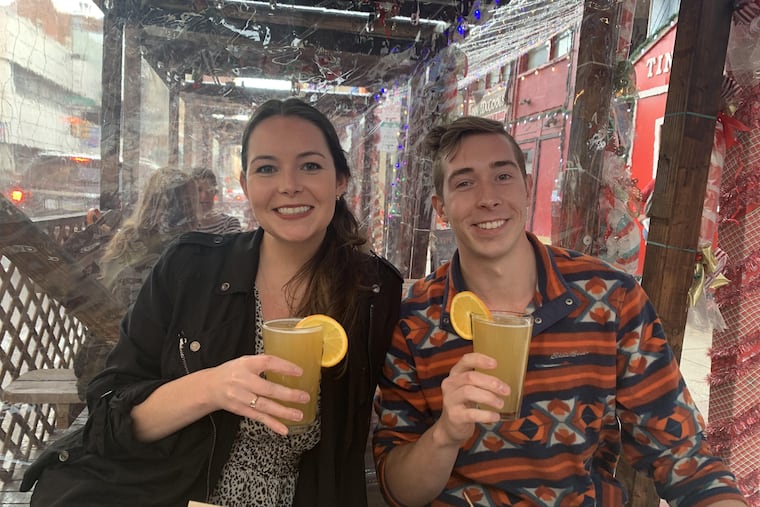‘You will die in prison’: Philadelphia man is sentenced to life in prison for murder of Brewerytown man walking his dog
Josephus Davis, 21, was convicted in the murder of Milan Loncar, who was fatally shot while walking his dog in Brewerytown last year.

After an emotional two-hour hearing that brought even a seasoned homicide prosecutor to tears, a Philadelphia man on Friday was ordered to spend the rest of his life in prison for fatally shooting a man as he walked his dog in Brewerytown last year.
Josephus Davis, 21, was convicted of second-degree murder, robbery, and related offenses in June for the killing of Milan Loncar, 25, a Wayne native and Temple University graduate. Loncar was walking his dog after work in January 2021 when Davis and another man held him at gunpoint in an attempted robbery. After rifling through his pockets, Davis shot Loncar in the chest, then ran away as Loncar lay bleeding on the street.
During Friday’s sentencing hearing, Common Pleas Court Judge Barbara A. McDermott read segments of the approximately 25 letters submitted by family and friends detailing how Loncar’s death has affected their lives. All described him as caring and loving, “the best person [they’d] ever met.”
Jelena Loncar, 28, said she has not been able to work more than 20 hours per week since her brother’s death. She sold her house in Brewerytown after the shooting and, along with other family and friends, moved out of Philadelphia, the pain and fear of the ongoing violence crisis too much to bear.
“You stole my brother’s future,” she told Davis. “You threw away your future.”
Kim Lounsberry said losing her son has dismantled her life: “What is there to hope for anymore?”
And even as Davis maintained his innocence, and his mother testified of his traumatic childhood filled with abuse and instability, Judge McDermott was firm in meting out his punishment.
“You will die in prison,” she said.
McDermott sentenced Davis to life in prison without the possibility of parole, the mandatory sentence in Pennsylvania for second-degree murder.
Davis showed little emotion as he appeared in court via Zoom from the Philadelphia Industrial Correctional Center. He stared stoically at the camera and, at times, yawned. In his final remarks, he said that he was innocent and that jurors “found me guilty based on clothing.” His race, he said, may have played a role.
“It’s a shame that another Black male, young male, is losing his life to the system,” he said. “It’s another white judge, white family, white DA, and another Black male.”
Then he told his mother, younger sister, and grandparents that he loved them.
Davis’ lawyer, Douglas Dolfman, said that the case was tragic all around and that he would file a motion appealing the sentence and declaring there was insufficient evidence to convict him.
Prosecutors, though, said the evidence was clear: As Loncar walked his dog, Roo, near 31st and Jefferson Street that January evening — two blocks from his residence, and a half-block from Davis’ — Davis and an accomplice attacked him.
Later that night, Davis was stopped by police in Kensington after officers recognized the car he was in as having been reported stolen in a carjacking the day before. Davis and a few other men hopped out and ran, Assistant District Attorney Joanne Pescatore said.
When police caught and questioned Davis, he wore a distinctive belt and shoes — evidence prosecutors used to match him to surveillance video of Loncar’s murder. Police later tested Davis’ clothes for ballistics evidence and found a small amount of gunshot residue on one of his jackets. The accomplice has not been identified.
Davis, one of 14 children, spent most of his life in the system, family testified. His mother said he was taken from her, along with his siblings, when he was 8, and forced to live with his father, who struggled with addiction and homelessness. Davis was arrested for the first time at 14 for assault, and bounced between numerous behavioral health facilities through his childhood. When he was 12 years old, his mother said, Davis witnessed a facility staffer fatally beat another child.
“You all think he is a monster,” she said. “But the streets turned him that way.”
Davis’ crimes continued into adulthood. He was arrested four times for robbery and aggravated assault, the judge said. He was on probation for robbery at the time of the murder, and was awaiting trial on charges of carjacking and assaulting a jail guard. He had been released from jail two weeks before killing Loncar.
Two of Davis’ brothers are also in police custody for unrelated shootings, including his identical twin brother, who’s now his cellmate, said Pescatore, who prosecuted the case.
“I can only imagine the rest of Philadelphia will be safe because Mr. Davis will no longer be among us,” she said.
Still, Loncar’s loved ones expressed sorrow for Davis’ family and his life ahead.
“This is not something I have ever wanted for another human being,” Lounsberry told her son’s killer. “Please be safe in this world. And be kind to those around you.”